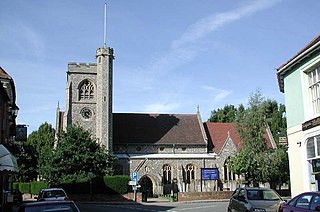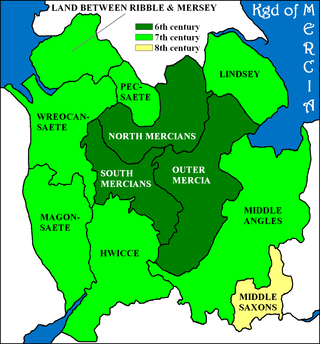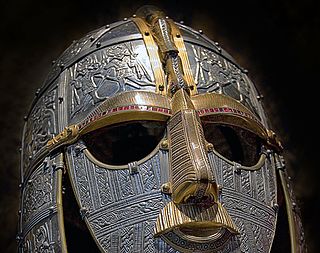Related Research Articles

The Kingdom of the East Saxons, referred to as the Kingdom of Essex, was one of the seven traditional kingdoms of the Anglo-Saxon Heptarchy. It was founded in the 6th century and covered the territory later occupied by the counties of Essex, Middlesex, much of Hertfordshire and west Kent. The last king of Essex was Sigered of Essex, who in 825 ceded the kingdom to Ecgberht, King of Wessex.

Hertfordshire is a ceremonial county in the East of England and one of the home counties. It borders Bedfordshire to the north-west, Cambridgeshire to the north-east, Essex to the east, Greater London to the south, and Buckinghamshire to the west. The largest settlement is Watford, and the county town is Hertford.

Welwyn is a village and civil parish in Hertfordshire, England. The parish also includes the villages of Digswell and Oaklands. It is sometimes referred to as Old Welwyn or Welwyn Village, to distinguish it from the much newer and larger settlement of Welwyn Garden City, about a mile to the south.

Hertfordshire is an English county, founded in the Norse–Saxon wars of the 9th century, and developed through commerce serving London. It is a land-locked county that was several times the seat of Parliament. From origins in brewing and papermaking, through aircraft manufacture, the county has developed a wider range of industry in which pharmaceuticals, financial services and film-making are prominent. Today, with a population slightly over 1 million, Hertfordshire services, industry and commerce dominate the economy, with fewer than 2000 people working in agriculture, forestry and fishing.

The Britons, also known as Celtic Britons or Ancient Britons, were the indigenous Celtic people who inhabited Great Britain from at least the British Iron Age until the High Middle Ages, at which point they diverged into the Welsh, Cornish, and Bretons. They spoke Common Brittonic, the ancestor of the modern Brittonic languages.

The Rodings are a group of eight villages in the upper part of the River Roding and the west of Essex, England, the largest group in the country to bear a common name. The Rodings do not lie within a single district in the county; they are arranged around the tripoint of the administrative areas of Chelmsford, Uttlesford and Epping Forest. An alternative arcane name, linked to the Middle English Essex dialect, was The Roothings.

The Tribal Hidage is a list of thirty-five tribes that was compiled in Anglo-Saxon England some time between the 7th and 9th centuries. It includes a number of independent kingdoms and other smaller territories, and assigns a number of hides to each one. The list is headed by Mercia and consists almost exclusively of peoples who lived south of the Humber estuary and territories that surrounded the Mercian kingdom, some of which have never been satisfactorily identified by scholars. The value of 100,000 hides for Wessex is by far the largest: it has been suggested that this was a deliberate exaggeration.
The Basingas were an Old English tribe, whose territory in the Loddon Valley formed a regio or administrative subdivision of the early Kingdom of Wessex. Their leader, Basa, gave the tribe its name which survives in the names of Old Basing and Basingstoke, both in Hampshire.

The Wreocensæte, sometimes anglicized as the Wrekinsets, were one of the peoples of Anglo-Saxon Britain. Their name approximates to "Wrekin-dwellers". It is also suggested that Wrexham also derived from Wreocensæte.

The settlement of Great Britain by diverse Germanic peoples, who eventually developed a common cultural identity as Anglo-Saxons, changed the language and culture of most of what became England from Romano-British to Germanic. This process principally occurred from the mid-fifth to early seventh centuries, following the end of Roman rule in Britain around the year 410. The settlement was followed by the establishment of the Heptarchy, Anglo-Saxon kingdoms in the south and east of Britain, later followed by the rest of modern England, and the south-east of modern Scotland. The exact nature of this change is a topic of on-going research. Questions remain about the scale, timing and nature of the settlements, and also about what happened to the previous residents of what is now England.
The Beormingas were a tribe or clan in Anglo-Saxon England, whose territory possibly formed a regio or early administrative subdivision of the Kingdom of Mercia. The name literally means "Beorma's people" in Old English, and Beorma is likely to have been either the leader of the group during its settlement in Britain or a real or legendary tribal ancestor. The name of the tribe is recorded in the place name Birmingham, which means "home of the Beormingas".

In medieval England, avera and inward were feudal obligations assessed against a royal demesne. The terms refer to various services rendered to the crown in lieu of payment in coin. Avera is connected with carrying items by horse, or possibly ploughing or both. Inward is probably the provision of a bodyguard during a royal visit: in Anglo-Saxon England it could be claimed by a sheriff. The services could usually be commuted to a monetary payment: in Hertfordshire avera could be commuted for fourpence. The services were usually found in the eastern counties, especially Cambridgeshire and Hertfordshire, due from sokemen. In Hertfordshire, inward is found only in the manor of Hitchin.

Berkhamsted Castle is a Norman motte-and-bailey castle in Berkhamsted, Hertfordshire. The castle was built to obtain control of a key route between London and the Midlands during the Norman conquest of England in the 11th century. Robert of Mortain, William the Conqueror's half brother, was probably responsible for managing its construction, after which he became the castle's owner. The castle was surrounded by protective earthworks and a deer park for hunting. The castle became a new administrative centre of the former Anglo-Saxon settlement of Berkhamsted. Subsequent kings granted the castle to their chancellors. The castle was substantially expanded in the mid-12th century, probably by Thomas Becket.
An Anglo-Saxon multiple estate was a large landholding controlled from a central location with surrounding subsidiary settlements. These estates were present in the early Anglo-Saxon period, but fragmented into smaller units in the late Anglo-Saxon period. Despite some academic criticism, the concept has been widely used and a large number of possible examples have been proposed.
Regiones or provinciae,(singular: provincia), also referred to by historians as small shires or early folk territories, were early territorial divisions of Anglo-Saxon England, referred to in sources such as Anglo-Saxon charters and the writings of Bede. They are likely to have originated in the years before 600, and most evidence for them occurs in sources from or about the 7th century.
The Tewingas were a tribe or clan of Anglo-Saxon England, whose territory was centred on the settlement of Welwyn in modern-day Hertfordshire, the site of an early Minster church, and the nearby settlement of Tewin. Its name means either "the people of Tiwa" or "the worshippers of the God Tew".
The Waeclingas were a tribe or clan of Anglo-Saxon England. Their territory or regio was based in the modern city of St Albans, whose name is recorded as Wæclingaceaster in the writings of Bede in the early 8th century, and in an early 10th century Anglo-Saxon charter. Before the territory came under Mercian control around 660 it may have formed part of the province of the Middle Saxons, or it may have fallen under the influence of the Kingdom of Essex – neither is certain.

St. Mary's Church is a Church of England church located in Welwyn, Hertfordshire, in the United Kingdom. It is north of the River Mimram and within the Welwyn conservation area. The present church building is a grade II listed building.

Braughing hundred was a judicial and taxation subdivision of Hertfordshire, in the east of the county, that existed from the 10th to the 19th century.

Edwinstree was a judicial and taxation subdivision of Hertfordshire, in the east of the county, that existed from the 10th to the 19th century.
References
- 1 2 3 Williamson 2000, p. 64.
- ↑ Williamson 2000, p. 63.
- ↑ Williamson 2013, p. 85.
- 1 2 Bailey 1989, p. 115.
- 1 2 Williamson 2013, p. 84.
- ↑ Rowe & Williamson 2013, p. 116.
- ↑ Williamson 2000, p. 85.